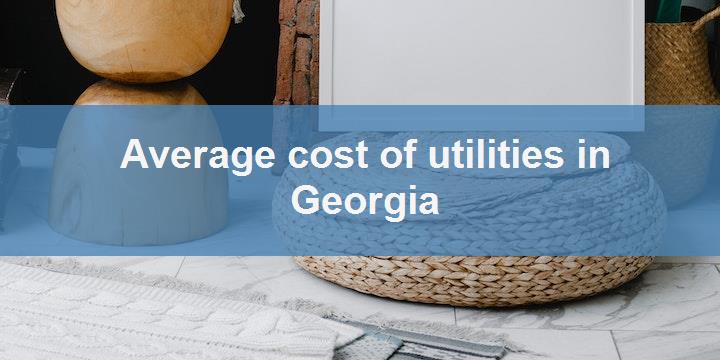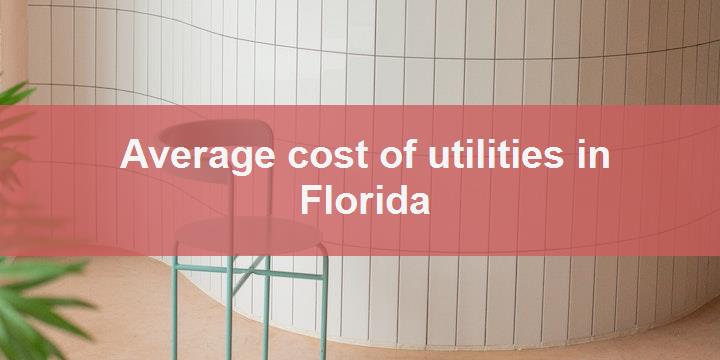Planning your monthly budget in Georgia? Understanding utility expenses is key. For a family of three living in a single-family home with standard appliances used year-round, the average cost of utilities in Georgia is $687.41 in 2025. Thanks to Georgia’s hot, humid summers and mild winters, utility costs can fluctuate throughout the year. In this guide, I’ll break down utility expenses across different household setups and seasonal shifts, giving you a clear picture of what to expect when managing your budget in Georgia.
Average Electric Bill in Georgia
Electricity costs are a major factor in household budgets, especially in a state like Georgia, where seasonal changes drive fluctuations in energy use. The average electric bill in Georgia is $142.51 in 2025, based on a typical family of three living in a single-family home. With hot, humid summers and mild winters, Georgia’s climate plays a significant role in electricity consumption. This average includes both winter usage ($171.37) and summer demand ($113.64).
Georgia vs. South Carolina: Summer Energy Cost Comparison
How does Georgia compare to its neighbor? The table below breaks down summer electricity expenses for a large single-family home with four people in Georgia and South Carolina. This comparison highlights differences in energy consumption and costs between the two states.
| Criteria | Georgia | South Carolina |
|---|---|---|
| Total Consumption (kWh) | 862.12 kWh | |
| Electricity Rate (cents/kWh) | 14.08 ¢/kWh | 14.23 ¢/kWh |
| Estimated Monthly Cost | $121.39 | $122.68 |
| Detailed Cost Breakdown | ||
| Base Usage: 412.12 kWh | $58.03 | $58.64 |
| Refrigerator: 120 kWh | $16.9 | $17.08 |
| Air Conditioner: 240 kWh | $33.79 | $34.15 |
| Clothes Dryer: 90 kWh | $12.67 | $12.81 |
| Georgia estimated monthly cost is lower than South Carolina by 1.05%. | ||
Historical Trends in Summer Electricity Prices
The chart above tracks historical electricity price trends for large single-family homes in Georgia during the summer. Understanding these trends helps homeowners anticipate future costs and make informed decisions about energy efficiency.
Comparison of Electricity Costs Across States
Here is a detailed comparison of electricity costs across various states, considering different household types and seasons. This table offers a comprehensive view of utility expenses.
| State | People | Household Type | Season | Appliances | Electric Monthly Bill |
|---|---|---|---|---|---|
| New York | 3 | One-bedroom apartment | Summer | Fridge, AC, Dryer |
$148.77 |
| California | 4 | Single-family large | Winter | Heater, Dryer, Fridge |
$407.08 |
| Texas | 3 | Townhouse | Winter | Heater, Dryer, Fridge |
$168.56 |
| Florida | 3 | Single-family small | Summer | Fridge, AC, Washer |
$102.05 |
| Illinois | 4 | Two-bedroom apartment | Summer | Fridge, AC, Washer |
$99.77 |
| Washington | 2 | Studio | Winter | Heater, Fridge |
$104.83 |
| Georgia | 2 | Townhouse | Summer | Fridge, AC, Washer |
$93.28 |
For a more detailed and personalized utility expense estimate, visit our Electricity Bill Calculator. Adjust the parameters to match your household specifics and get an accurate estimate tailored to your needs.
Average Gas Bill in Georgia
Keeping track of your household budget in Georgia starts with understanding utility costs—especially gas. The average gas bill in Georgia is $293.58 in 2025, based on a typical family of three living in a single-family home. Georgia’s hot summers and mild winters play a significant role in gas usage, with higher consumption during the colder months for heating.
To calculate this average, both winter consumption ($430.03) and summer usage ($157.12) are taken into account, reflecting seasonal shifts in energy demands.
Georgia vs. North Carolina: A Summer Gas Usage Comparison
How do Georgia’s summer gas costs stack up against its neighbor, North Carolina? The table below compares gas expenses for a large single-family home with four people during the summer in both states. This comparison highlights differences in energy consumption and costs influenced by climate and household size.
Gas Bill Comparison Overview
| Criteria | Georgia | North Carolina | Avg. USA |
|---|---|---|---|
| Total Consumption (MCF) | 6.99 MCF | ||
| Gas Rate ($/MCF) | $26.85 | $19.83 | $17.73 |
| Estimated Monthly Cost | $187.73 | $138.65 | $123.97 |
| Appliance Cost Breakdown | |||
| Outdoor Grill | $14.82 | $10.95 | $9.79 |
| Water Heater | $108.69 | $80.27 | $71.77 |
| Gas Stove | $24.70 | $18.24 | $16.31 |
| Gas Oven | $39.52 | $29.19 | $26.10 |
| Georgia's estimated monthly cost is higher than North Carolina by 35.40%. | |||
| Georgia's estimated monthly cost is higher than the Avg. USA by 51.43%. | |||
Reviewing gas usage between Georgia and North Carolina provides valuable insights into how regional climate and home setups affect energy costs. This side-by-side comparison makes it easier to identify cost-saving opportunities based on household needs.
The historical chart above tracks gas price trends for large single-family homes in Georgia during the summer. By analyzing these patterns, you can better anticipate future costs and make informed decisions to optimize your household budget.
Gas Cost Comparison Across Various States
Here is a detailed comparison of gas costs across different states, considering various household types and seasons. This table offers a comprehensive view of utility expenses.
| State | People | Household Type | Season | Appliances | Gas Monthly Bill |
|---|---|---|---|---|---|
| New York | 3 | Townhouse | Summer | Water heater, Stove, Oven |
$88.71 |
| Florida | 2 | Studio | Summer | Water heater, Stove, Oven |
$82.41 |
| Vermont | 4 | Single-family small | Winter | Gas heating, Dryer, Oven |
$298.95 |
| Texas | 3 | Townhouse | Winter | Gas heating, Dryer, Oven |
$279.14 |
| Illinois | 3 | Single-family small | Summer | Water heater, Stove, Oven |
$79.83 |
| South Carolina | 4 | Single-family large | Summer | Water heater, Stove, Oven |
$134.85 |
| Michigan | 2 | Studio | Winter | Gas heating, Dryer, Oven |
$99.20 |
This comparison table offers a broad perspective on how gas costs vary across different states and household setups, helping you make more informed decisions about your energy usage.
For a detailed and personalized utility expense estimate, explore our Gas Bill Calculator. Customize the parameters to fit your household specifics and get an accurate estimate tailored to your needs.
Average Water and Sewer Bill in Georgia
When planning to move or invest in Georgia, understanding utility costs is key to effective budgeting. In 2025, the average water and sewer bill in Georgia is $48.00, making it a significant factor for prospective residents to consider.
Comparative Insights Across States
To put Georgia’s water and sewer costs into perspective, here’s how they compare with eight other states in the region:
| State | Average Water and Sewer Fees |
|---|---|
| Florida | $33.00 |
| Alabama | $70.00 |
| Tennessee | $63.00 |
| South Carolina | $53.00 |
| North Carolina | $50.00 |
| Virginia | $46.00 |
| Mississippi | $43.00 |
| Louisiana | $51.00 |
Georgia’s water and sewer fees are quite competitive, especially when compared to states like Florida and Virginia, where costs tend to be higher due to infrastructure demands and urban density.
Leveraging Georgia’s Climate for Water Efficiency
Georgia’s climate offers unique opportunities for efficient water use. Here are some strategies to help reduce water bills:
- Rainwater Harvesting: Take advantage of Georgia’s frequent rainfall by installing rain barrels to collect water for gardening and outdoor use.
- Seasonal Planting: Align your landscaping with Georgia’s growing seasons to maximize natural rainfall and reduce irrigation needs.
- Efficient Irrigation: Implement drip irrigation systems to deliver water directly to plant roots, minimizing waste.
Local Support and Conservation Programs
Georgia offers a variety of programs to support water conservation efforts, helping residents reduce costs while promoting sustainability:
- Rebates for Water-Efficient Appliances: Save money with state-sponsored rebates for purchasing water-saving fixtures and appliances.
- Community Workshops: Participate in local workshops to learn practical water conservation techniques tailored to Georgia’s climate.
- State Initiatives: Engage in state-led initiatives focused on sustainable water management and environmental stewardship.
Water Quality and Health
Water quality is a top priority in Georgia. The state enforces rigorous standards to ensure that residents have access to clean, safe drinking water. This focus on quality not only promotes health and well-being but also reduces the need for additional water filtration systems.
Conclusion
Georgia’s affordable water and sewer fees, combined with effective water management strategies and strong state support, make it an attractive choice for homeowners and investors. Whether you’re moving to Georgia or considering a property investment, our team is here to help you make informed decisions with the latest data and expert insights.
Garbage/Trash Removal Bill in Georgia
When managing household expenses in Georgia, it’s important to factor in waste management costs. The average cost for garbage and trash removal services in Georgia in 2025 is around $23.00. These costs can vary based on factors like your service provider, the frequency of pick-ups, and whether recycling services are included in your plan.
Georgia’s waste management practices differ across urban and rural areas. Many communities have implemented robust recycling programs and yard waste collection services, which can influence the overall cost of garbage removal.
Garbage/Trash Removal Costs Comparison Across States
To give you a broader perspective, here’s how Georgia’s average garbage and trash removal costs compare with neighboring states:
| State | Average Cost |
|---|---|
| Georgia | $23.00 |
| Alabama | $20.00 |
| South Carolina | $23.00 |
| Florida | $24.00 |
| Tennessee | $24.00 |
| North Carolina | $24.00 |
| Mississippi | $20.00 |
| Louisiana | $21.00 |
| Arkansas | $22.00 |
| Texas | $25.00 |
From this comparison, it’s clear that Georgia’s garbage removal costs are competitive, especially compared to states like Florida and North Carolina, where urban infrastructure and waste processing can drive prices higher. Georgia’s efficient waste management programs help keep these costs manageable for residents.
💡 Pro Tip: To save on garbage removal costs, consider bundling waste services with recycling or yard waste options, as many providers offer discounts for combined services.
Understanding these costs is crucial for effective budgeting. If you have any questions or need personalized guidance on managing your utility expenses in Georgia, our team is here to help!
Internet and Cable TV Expenses in Georgia
Staying connected in Georgia comes with its own set of costs, and managing internet and cable TV expenses is an important part of household budgeting. The average internet and cable TV expenses in Georgia in 2025 are around $113.66, though prices can vary depending on your location and service provider.
Georgia offers a diverse range of internet and cable TV providers, giving residents plenty of options to choose from. This competition helps keep prices competitive while ensuring high-quality service across both urban and rural areas.
Provider Price Comparison in Georgia
Here’s a breakdown of average prices for popular providers in Georgia, covering internet, cable TV, and bundle packages:
| Provider | Internet Price | Cable TV Price | Bundle Price |
|---|---|---|---|
| Comcast | $59.99 | $70.99 | $114.99 |
| Verizon | $60.99 | $71.99 | $121.99 |
| AT&T | $55.99 | $66.99 | $103.99 |
These providers offer a range of packages, so it’s important to compare options to find the plan that best fits your household’s needs.
Internet and Cable TV Cost Comparison Across States
To see how Georgia stacks up, here’s a comparison of average internet and cable TV expenses with neighboring states:
- Florida: $114.66
- Alabama: $109.66
- Tennessee: $116.32
- South Carolina: $112.66
- North Carolina: $114.66
- Mississippi: $114.66
- Kentucky: $112.66
- Virginia: $111.66
Georgia’s internet and cable TV costs are competitive, especially compared to states like Florida and Tennessee, where urban infrastructure can drive prices higher. This highlights the importance of shopping around to secure the best deals and services.
💡 Pro Tip: To get the best value, compare different providers and bundle packages. Consider factors like internet speed, data limits, and additional features to ensure you’re getting the most for your money. 🌐
Home Phone and Mobile Phone Costs in Georgia
Managing home phone and mobile phone costs is a key part of household budgeting in Georgia. The average home phone and mobile phone costs in Georgia in 2025 are around 66.66, though these expenses can vary based on your location and service provider.
Georgia offers a wide range of phone service providers, giving residents plenty of options to choose from. This competition helps keep prices competitive while ensuring reliable service across urban and rural areas.
Phone Service Provider Price Comparison in Georgia
Here’s a breakdown of pricing from popular providers in Georgia, covering both mobile and home phone services:
| Provider | Mobile Phone Price | Home Phone Price |
|---|---|---|
| Verizon | $71.99 | $38.99 |
| AT&T | $66.99 | $33.99 |
| T-Mobile | $60.99 | Doesn’t provide |
These prices give you a clear picture of available options, helping you choose the plan that best fits your communication needs and budget.
Home and Mobile Phone Cost Comparison Across States
To see how Georgia compares, here’s a look at average phone costs in neighboring states:
- Florida: 65.66
- Alabama: 62.66
- South Carolina: 66.66
- North Carolina: 64.66
- Tennessee: 68.32
- Mississippi: 65.66
- Louisiana: 64.66
- Texas: 64.66
Georgia’s phone costs are relatively moderate, especially when compared to neighboring states like Florida and Alabama, where urban infrastructure and higher demand can drive prices up. This makes it important to compare plans to find the best deals.
📞 Pro Tip: To get the best value, regularly compare phone plans from different providers. Look beyond just the price—consider coverage, data limits, and additional perks to ensure you’re getting the most for your money.
Stay Updated for the Best Deals
Since providers frequently update their plans and pricing, it’s smart to review available options regularly. Our team updates this article monthly with the latest rates and provider information, ensuring you have the most current insights to make informed decisions.
FAQ
Q: 💡 What is the average monthly electric bill in Georgia in 2025?
A: The average monthly electric bill for Georgians in 2025 is approximately $142.51.
Q: 🔥 What is the average monthly gas bill for Georgians in 2025?
A: The average monthly gas bill for Georgians in 2025 stands at approximately $293.58.
Q: 🚰 What is the average monthly water and sewer bill in Georgia in 2025?
A: The average monthly water and sewer bill in Georgia in 2025 is around $48.00.
Q: 🗑️ What is the average monthly garbage and trash removal cost in Georgia in 2025?
A: The average monthly garbage and trash removal cost in Georgia in 2025 is about $23.00.
Q: 📡 What is the average monthly internet and cable TV bill in Georgia in 2025?
A: The average monthly internet and cable TV bill in Georgia in 2025 is approximately $113.66.
Q: 📱 What is the average monthly home and mobile phone bill in Georgia in 2025?
A: The average monthly home and mobile phone bill in Georgia in 2025 is around 66.66.
Q: 🧾 What is the total average monthly cost of utilities in Georgia in 2025?
A: The total average monthly cost of utilities in Georgia in 2025 is approximately $687.41.



